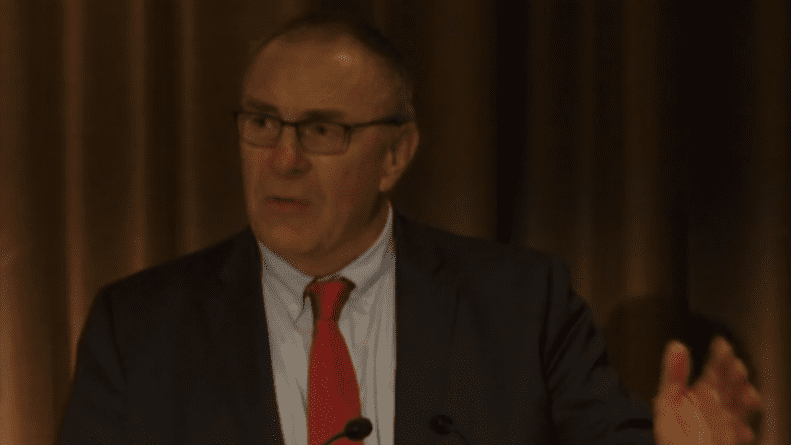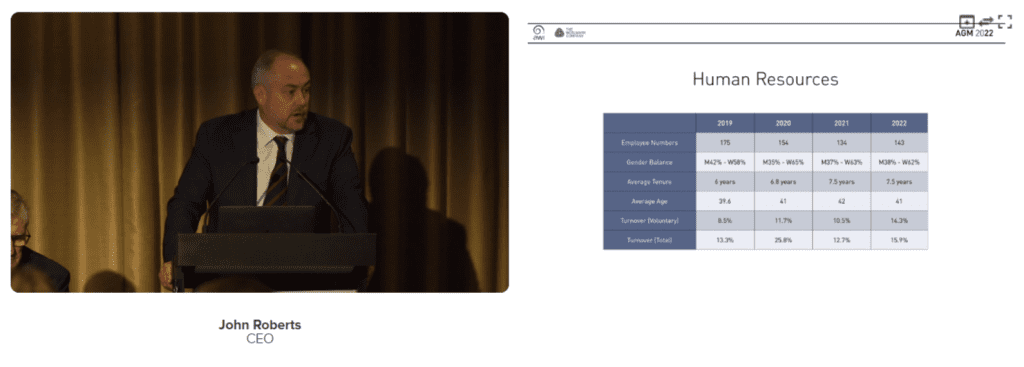
AWI chairman Jock Laurie at the company’s annual general meeting today.
AUSTRALIAN Wool Innovation chairman Jock Laurie has called for continued grower support as he outlined the industry’s priorities and challenges at the company’s annual general meeting today.
The meeting in Sydney did not consider any motions and only 637 valid proxy forms were lodged for the meeting, equal to 27,491 voting rights, representing 3.52 percent of the total voting rights.
Mr Laurie said shearer training remained Australian Wool Innovation’s number one issue across the nation.
“It is really critical that we can actually let our people get their sheep shorn … get them shorn at a price that is fair and reasonable.
“Some of the escalating prices that we are hearing around shearing is doing incredible damage to people and driving them away from the industry at the moment,” he said.
“I think while there are opportunities being taken at the moment, that’s fine, but what we are doing is really seeing a challenge when it comes to people wanting to stay in the industry because of the costs that are being associated with that.”
Mr Laurie said the challenges included competing with other agricultural sectors on land use, bushfires, the current floods, the international economic conditions, defending wool as a natural fibre, through its ad campaigns and getting sustainability and traceability right.
He said the combination of building demand and research and development to find “better ways, better chemicals” to reduce the on-farm cost of production will keep wool competitive in the challenging land use environment in Australia.
“Wool growing has to be competitive against all those other commodities on farm (sheep meat, grains) to be able to maintain numbers to maintain production.”
COVID restrictions in China, Australia’s biggest wool market, were also still limiting domestic wool purchasing activity, he said.
Mr Laurie said AWI had to invest properly and invest in projects that are critical and defend the fibre, delivering on projects that deliver real outcomes that make a difference and keep people “in the game”.
“At the same time what we need to do is we need to get the support of the broader industry across Australia.
“We need the support of the government.”
Mr Laurie said the Federal Government was a big payer into the rural research and development corporations like AWI.
“And we need them to understand what we are doing and we need the industry to understand what we are doing.
“And in the end we’re only a very small market in a very competitive marketplace and we need people in the industry to support AWI to do what we’re doing,” he said.
“So we have to identify the projects with your help, we’ve got to identify the right projects to invest in from the marketing point of view and a research point of view.
“And we need and want your support going out there so we can go out there and really drive this and try eliminate some of the things that I’m talking about.”
Mr Laurie highlighted the growing importance on traceability and sustainability for wool growers and consumers.
“AWI is ahead of the game on traceability and we a very strong position to take it forward.
“A lot of the traceability stuff was developed by WoolQ,” he said.
“Traceability and sustainability is absolutely critical,” Mr Laurie told the meeting,
Mr Laurie said if AWI did “go into this sustainability stuff” and invest — with all AWI’s manager telling the board that sustainability and traceability were critical issues — the company wanted the support of the industry.
“It’s far better if we can get support than no support.
“We don’t want to be fighting against the industry; we’re not here to play politics, we’re here to deliver outcomes,” he said.
“We want to keep people growing wool and the only way to do that is to make sure that we are focussing on what we need to be doing.”
He said the board has had discussions that it needed to be clear that its outcome should be to maintain profitability and maintain wool-growing.
Mr Laurie said the current 1.5 percent grower levy meant AWI was operating in a “very constrained financial environment”.
“One-and-half percent at the last Wool Poll that’s the decision of wool growers, that’s fine, but what it does is take 25 percent of our income away and we now need to manage the company,” he said.
‘Downsized’ AWI has more staff in 2022 than last year

Mr Laurie said the AWI board had “downsized the company” and was managing AWI on nearly a daily basis on financial issues, although AWI chief executive officer John Roberts later told the meeting that staff members had risen from 134 in 2021 to 143 in 2022.
Mr Roberts said the wool industry was facing more challenges than a year ago, when these included casualisation, geopolitical tensions, and a desperate shortage of shearers.
“12 months on these challenges mostly remain and we have a number of additional factors to contend with including the war in the Ukraine and the skyrocketing energy price that it brings, domestic floods causing widespread damage across most of the eastern states, the threat of FMD, the rampant spread of barbers pole worm, unyielding demand for provenance and traceability and the push for sustainability.”
He said whilst the threat of COVID-19 may have subsided the economic impost it has caused globally is becoming a reality contributing to what is commonly becoming known as recession anxiety.
“Now, although this list has not got any shorter, I can say with confidence that AWI has never been better prepared to take on these challenges and in many cases transition them into real opportunities.”
Mr Roberts said AWI has a strong, cohesive and supportive board that communicates and listens to stakeholders and AWI staff.
“We have a new strategic plan that has been developed with real input industry.
“We are delivering bold and targeted projects in marketing, on and off farm,” he said.
“We are developing our measurement and evaluation framework to allow us to report on the company’s achievements with clear and tangible outputs and outcomes.
“Our consultation structures are open and inclusive which affords us highly valuable input and feedback from which to learn and evolve as a company,” Mr Roberts said.
“Underpinning all this and allowing us to deliver is a highly cohesive and dedicated working team.
“The good people in AWI and The Woolmark Company are your greatest asset, and I am privileged and humbled to lead and serve them in my capacity as CEO.”
Senior staff leaving AWI
Former AWI chairman Wal Merriman told the meeting he had become aware that some senior staff were leaving the company, including research general manager Jane Littlejohn, company secretary Jim Story and former national events manager Wendi Ridgley.
“I spent many years working with those staff and I was responsible in some instances for their employment, that is Jane Littlejohn, Jim Story and I have recently been informed that Wendy Ridgley has left the company.
“I’d just like it recorded here that my personal congratulations and support for the loyalty and the work those people have done on behalf of us shareholders, thank you.”
An AWI spokesman said Mr Story was attending his final AWI AGM and is retiring at a time to be determined. Dr Littlejohn is also retiring and Ms Ridgley has left the company.

One of the biggest costs of shearing is the workers compensation. AWI should look into it.